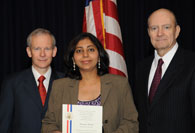Purnima Ratilal is winner of Presidential Early Career Award for Scientists and Engineers (PECASE)

Electrical and computer engineering assistant professor Purnima Ratilal was selected by the Department of Defense as a winner of the 2007 Presidential Early Career Award for Scientists and Engineers, the nation’s most esteemed prize honoring cutting-edge independent scientific research conducted by young faculty members. In support of her research, Ratilal will receive $200,000 per year for five years from the DoD.
Ratilal was one of 67 scholars chosen for the award by nine federal departments and agencies. On Dec. 19, she and her fellow recipients were honored at the White House in a ceremony led by John H. Marburger III, science advisor to the president and director of the White House Office of Science and Technology Policy.
“To receive this award is a dream come true,” Ratilal says. “It is a very prestigious award for young faculty, and when I heard about it, I was extremely overjoyed and beyond words.”
Ratilal’s research focuses on exploring acoustic, seismic and ultrasound remote sensing in the ocean for military, ecology and commercial applications. Current projects include a remote acoustic sensing system for rapidly imaging and localizing schools of fish and other biology over wide areas, spanning thousands of square kilometers, in near real time and an “extinction theorem” used to design an acoustic ''burglar alarm'' or ''trip-wire'' system for detecting submerged objects.
Such projects are useful to regulatory agencies and fishermen who wish to track the movement of fish, but also to the Office of Naval Research, whose officers have difficulty distinguishing between various underwater objects.
“Fish are the main cause of false alarm or clutter for the Navy,” Ratilal says, noting that it is interested in developing signal processing and tactical approaches for classifying objects in the ocean. One approach for accomplishing this is to use acoustic color, distinguishing targets based on their scattering response as a function of frequency with an acoustic sensing system.
Ratilal’s mentor, electrical and computer engineering professor Carey Rappaport, said Ratilal’s award distinguishes her as one of the world’s experts on using and processing sonar data in the ocean. “Whenever the president of the United States hands out an award,” he says, “it puts the recipient in the upper-echelon of achievement. For a Northeastern faculty member to be represented among the winners is pretty fantastic.”
Funding from the DoD will go toward hiring undergraduate, graduate and postdoctoral associates, as well as toward research analysis and experiments, Ratilal said.
— Jason Kornwitz
Photo: Professor Purnima Ratilal, center, stands with John Marburger, science advisor to the president, right, and William Rees, deputy under secretary of defense for laboratories and basic sciences.